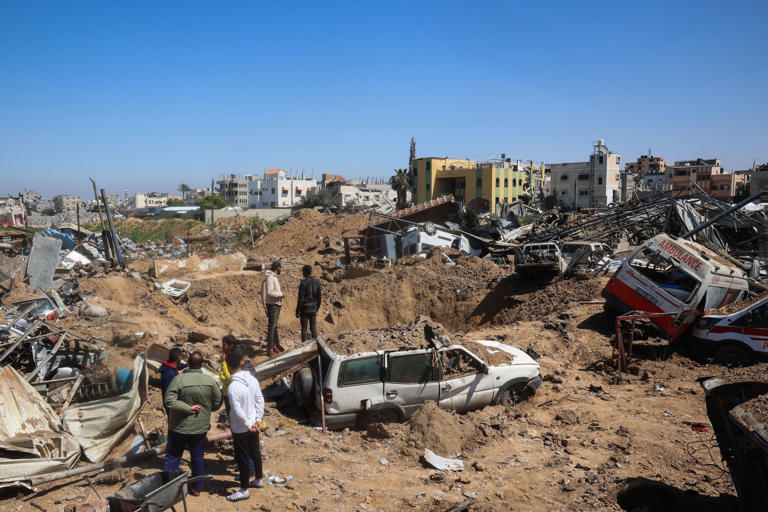Israeli Evacuation Orders and Strikes Force Mass Displacement in Gaza
Israeli Evacuation Orders and Attacks on Gaza Displace More Palestinians
The Israeli military issued new evacuation orders late Monday, forcing another mass displacement of Palestinians in northern Gaza. Families who had returned to their devastated homes in late January after months of war were once again ordered to leave under the threat of imminent attacks. The Israeli military described these directives as a final warning before launching strikes.
According to the U.N. agency for Palestinian refugees, nearly 125,000 people have fled in recent days due to Israeli bombardments and military operations. The United Nations estimates that over 14 percent of Gaza has been affected by evacuation notices, alongside vast “no-go” zones along the border, worsening an already dire humanitarian crisis. U.N. spokesman Stéphane Dujarric confirmed these figures on Monday, raising concerns about the ongoing displacement of civilians.
As the evacuation orders reached Jabalya past 10 p.m., families had little choice but to flee on foot in the dark, seeking safer ground. Similar warnings were issued two hours earlier for Beit Lahia and Beit Hanoun, leaving thousands scrambling for shelter. Razan Faisal, a Jabalya resident who decided to stay, described the harrowing conditions. “People left under the cover of darkness,” she said. “We have many elderly people and children, and evacuations involve walking for long hours, which is extremely difficult. There is no aid, and only a few supplies are available in the market at extremely high prices.”
Since Israel resumed bombing Gaza on March 18, following the collapse of a fragile truce, more than 792 people have been killed, the Gaza Health Ministry reported Tuesday. The ministry states that over 60 percent of the victims are women and children. The overall death toll in Gaza has surpassed 50,082, with more than 113,408 wounded since the start of the war, a staggering humanitarian toll that continues to rise daily.
Israel launched its military operation following the Hamas attack on October 7, 2023, which killed approximately 1,200 people, including over 300 soldiers. Since then, at least 407 Israeli soldiers have been killed in combat. The ongoing conflict has sparked widespread criticism, with international organizations and governments calling for immediate de-escalation and humanitarian assistance for civilians trapped in Gaza.
Meanwhile, the United Nations has announced a significant reduction in its presence in Gaza due to escalating violence. Approximately one-third of its 100 international staff will be temporarily relocated due to security concerns. U.N. spokeswoman Alessandra Vellucci emphasized, “We are not abandoning Gaza,” explaining that the decision was made because the agency could no longer guarantee the safety of its employees amid relentless attacks.
In a concerning development, a U.N. guesthouse in central Gaza was hit by Israeli tank fire on March 19, killing a Bulgarian staff member and injuring five others. The United Nations stated that the location had been repeatedly deconflicted with the Israeli military, yet it was still targeted. Israel has denied responsibility for the strike, but U.N. spokesman Stéphane Dujarric insisted, “The Israelis knew exactly where this U.N. facility was, and it was hit by a shell from one of their tanks.”
The International Committee of the Red Cross (ICRC) has also raised alarms about attacks on humanitarian facilities. On Monday, the ICRC reported that its office in Rafah was damaged by an explosive projectile, despite being clearly marked and its location being shared with all parties. Fortunately, no staff were injured, but the incident has further hampered humanitarian operations in Gaza. The Israeli military admitted that its forces mistakenly fired on the Red Cross building after misidentifying it as a threat.
Amidst growing global concerns, aid organizations continue to warn about the deteriorating humanitarian conditions in Gaza. The U.N. relief agency for Palestinian refugees (UNRWA) reported that Israel’s siege and blockade have led to severe food shortages, with skyrocketing prices leaving many without basic necessities. UNRWA described the situation as a “human catastrophe,” urging international intervention to alleviate suffering.
Journalists have also been targeted in the ongoing violence, further complicating efforts to report on the crisis. On Monday, Israeli airstrikes killed two journalists in Gaza, including Al Jazeera reporter Hossam Shabat. The Israeli military accused Shabat of being affiliated with Hamas’s military wing, calling him a “sniper terrorist.” However, Al Jazeera and the Committee to Protect Journalists (CPJ) have strongly rejected these claims, condemning Israel’s actions as part of a “systematic campaign to silence journalists.” CPJ noted that Israel has repeatedly made “unproven statements” against journalists, undermining press freedom in the region.
Shabat, who was only 23 years old, had previously denied the allegations, calling them part of a propaganda effort. His last post on Instagram, just hours before he was killed, mourned the loss of another journalist, Mohammad Mansour, who was also killed in an Israeli strike the same day. A statement shared by Shabat’s supporters after his death read, “If you’re reading this, it means I have been killed—most likely targeted—by the Israeli occupation forces. When this all began, I was only 21 years old—a college student with dreams like anyone else.”
The relentless attacks on Gaza, mounting civilian casualties, and deteriorating humanitarian conditions have drawn widespread condemnation from the international community. As Israel continues its military operations, the global call for an immediate ceasefire and urgent humanitarian assistance grows louder.
For video news coverage, visit our YouTube channel: THE OLIGO.

